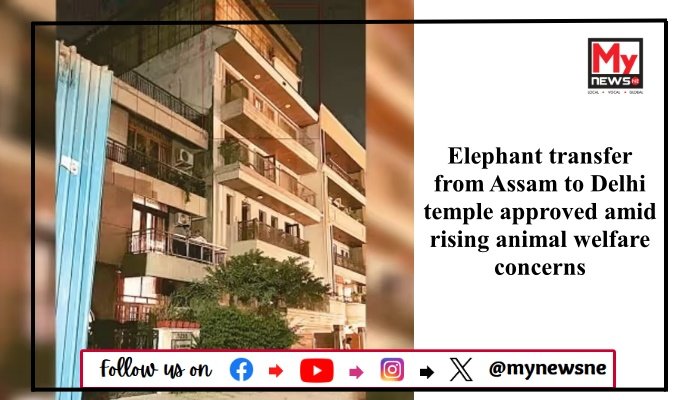Controversy Erupts Over Transfer of Elephant Ranjita from Assam to Delhi Temple
Guwahati: The proposal to transfer Ranjita, a female elephant from Assam, to the Maa Baglamukhi Temple in South Delhi has sparked significant controversy.
Approved by authorities, the move comes six years after Delhi’s last captive elephant was rescued following a Delhi High Court directive.
Ranjita is set to be relocated as part of the temple’s expansion, which includes a 1.5-acre plot near an army camp designated for her housing.
However, animal welfare groups have raised alarms over the plan, citing Delhi’s unsuitable climate and inadequate infrastructure for an elephant.
The Maa Baglamukhi Temple, which gained prominence in 2018 after hosting a high-profile national security ritual, has been at the center of this dispute. Temple management insists that proper arrangements have been made, but critics argue otherwise.
The process to relocate Ranjita began in April 2024, when the Assam Forest Department received a request from the temple. The High-Powered Committee (HPC), led by retired Justice Deepak Verma, reviewed the proposal, with South Delhi officials deeming the site suitable. Despite this, the Assam government has yet to finalize the decision, considering input from civil society.
Animal rights organizations, led by FIAPO (Federation of Indian Animal Protection Organizations), are actively opposing the transfer, raising concerns about Delhi’s extreme weather and urban setting. FIAPO’s Bharati Ramachandran emphasized that “Delhi is simply not equipped to provide for the needs of a captive elephant,” citing risks to Ranjita’s health and well-being.
FIAPO also argues that the transfer violates the 2024 Captive Elephant (Transfer or Transport) Rules, which permit relocations only under specific circumstances, such as when an elephant will receive better care. Activists fear the 1.5-acre plot will not meet Ranjita’s needs for space, social interaction, and access to natural resources, further stressing her mental and physical health.
The controversy has broader legal implications. FIAPO has filed a writ petition in the Delhi High Court, challenging provisions of the Wild Life (Protection) Act, 1972 and the 2024 Captive Elephant Rules, seeking clarity on transfers of captive elephants to religious institutions. The court has directed FIAPO to submit recommendations for regulating such transfers.
As the debate continues, the decision regarding Ranjita’s transfer is expected to set a precedent for future cases involving the welfare of captive elephants, drawing national attention to the delicate balance between religious practices, urban development, and animal rights in India.
Read More: Supreme Court Upholds Constitutional Validity of Section 6A of Citizenship Act in Landmark Judgment

